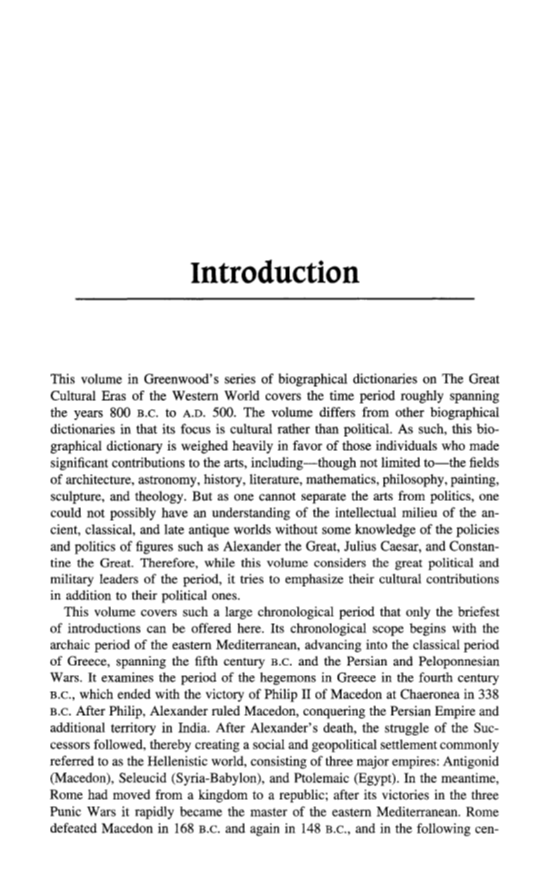Introduction This volume in Greenwood's series of biographical dictionaries on The Great Cultural Eras of the Western World covers the time period roughly spanning the years 800 B.C. to A.D. 500. The volume differs from other biographical dictionaries in that its focus is cultural rather than political. As such, this bio- graphical dictionary is weighed heavily in favor of those individuals who made significant contributions to the arts, including—though not limited to—the fields of architecture, astronomy, history, literature, mathematics, philosophy, painting, sculpture, and theology. But as one cannot separate the arts from politics, one could not possibly have an understanding of the intellectual milieu of the an- cient, classical, and late antique worlds without some knowledge of the policies and politics of figures such as Alexander the Great, Julius Caesar, and Constan- tine the Great. Therefore, while this volume considers the great political and military leaders of the period, it tries to emphasize their cultural contributions in addition to their political ones. This volume covers such a large chronological period that only the briefest of introductions can be offered here. Its chronological scope begins with the archaic period of the eastern Mediterranean, advancing into the classical period of Greece, spanning the fifth century B.C. and the Persian and Peloponnesian Wars. It examines the period of the hegemons in Greece in the fourth century B.C., which ended with the victory of Philip II of Macedon at Chaeronea in 338 B.C. After Philip, Alexander ruled Macedon, conquering the Persian Empire and additional territory in India. After Alexander's death, the struggle of the Suc- cessors followed, thereby creating a social and geopolitical settlement commonly referred to as the Hellenistic world, consisting of three major empires: Antigonid (Macedon), Seleucid (Syria-Babylon), and Ptolemaic (Egypt). In the meantime, Rome had moved from a kingdom to a republic after its victories in the three Punic Wars it rapidly became the master of the eastern Mediterranean. Rome defeated Macedon in 168 B.C. and again in 148 B.C., and in the following cen-
Document Details My Account Print multiple pages
Print
You have printed 0 times in the last 24 hours.
Your print count will reset on at .
You may print 0 more time(s) before then.
You may print a maximum of 0 pages at a time.































































































































































































































































































































































































































































































